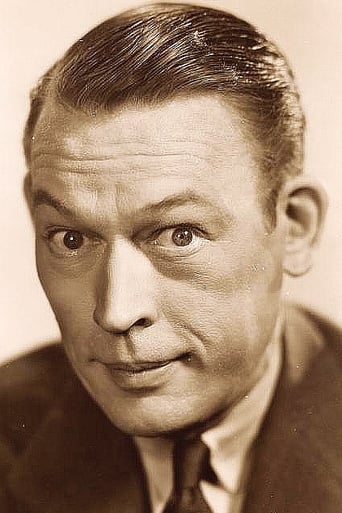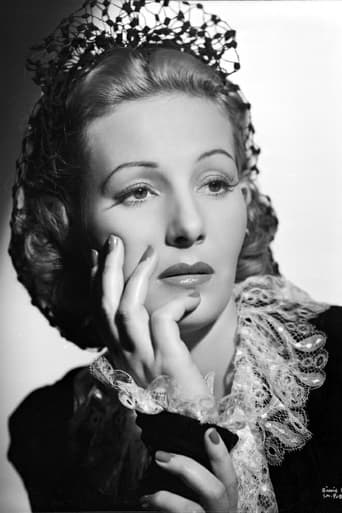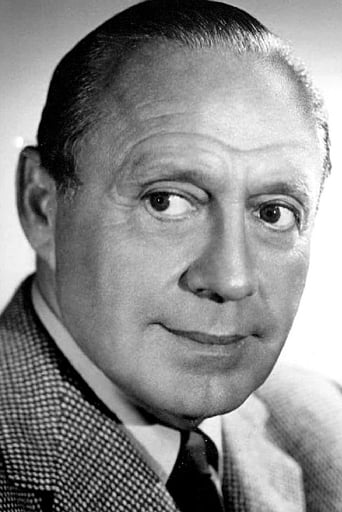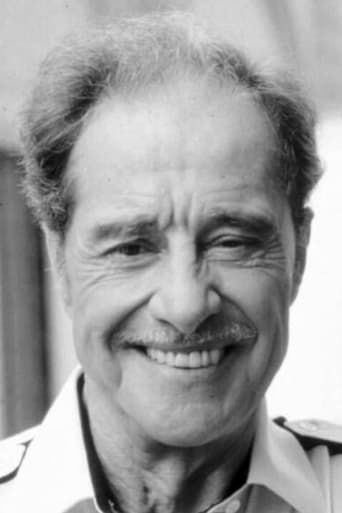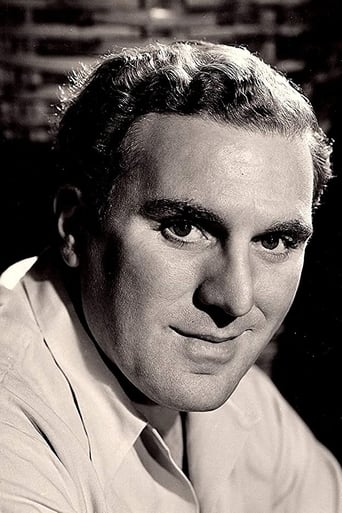Cubussoli
Very very predictable, including the post credit scene !!!
Exoticalot
People are voting emotionally.
Scarlet
The film never slows down or bores, plunging from one harrowing sequence to the next.
Frank Cullen
Other reviewers have explained the plot, so I'll simply tell you that I find this film funny and one of my top-rated movie comedies of all time (Blazing Saddles, Some Like it Hot, Olsen & Johnson's Hellzapoppin, Radio Parade of 1935, most of the film comedies starring Monty Python, Alastair Sim, Margaret Rutherford, Alec Guinness and almost all the classics by Chaplin, Keaton, Langdon, Lloyd, Laurel and Hardy, Marx Brothers, W. C. Fields, Mae West and Mel Brooks. During what seems in retrospect a scant decade following WWII, English language movies along with some stage plays, literature, network radio and early live television appealed to an American public better educated and verbally literate than generations before and after. In comedy of that fleeting era, there was frequently an absurdist streak and occasionally some commentary and deconstruction of the very medium in which it appeared. It's in the Bag is a good example of wit, absurdist comedy and deconstruction. An independent production built around the twin poles of a satiric Russian novel and acerbic comedian Fred Allen, it attracted co-stars willing to work for less than their usual salaries: Jack Benny, Binnie Barnes, Don Ameche, Robert Benchley, Rudy Vallee, Victor Moore, William Bendix, John Carradine, Sidney Toler and Jerry Colonna. The result is a series of scenes encountered by Fred Allen as he follows the trail of his missing chairs, one of which conceals a fortune. The script (written by Fred Allen, Morrie Ryskind, Lewis Foster, Jay Dratler & Alma Reville (Hitchcock's swife) is tight, clever, stuffed with incident and characters (most of them spoofing their on-screen personas). Directer Richard Wallace is efficient and compatible wirth the material and performers, and cinematographer Russell Metty was one of filmdom's finest and a favorite of Orson Welles, Stanley Kubrick, Don Siegel and Stweven Spielberg.
edwagreen
Ridiculous and utterly moronic film with Fred Allen as a circus barker who inherits $12 million and then it goes to $300,00, providing he can find the loot in a chair, stashed away by his murdered uncle.The premise is all right until we get to the locating of the chair. We chase around Mrs. Nussbaum's apartment for it, get involved with a brawl, and meet up with gangster William Bendix, ready to be overthrown by his gang of cut throats.Jack Benny plays himself and again shows how stingy he is. Had the film stuck with the original bad guy lawyer and his crowd, it would have been far better.Don Ameche and Victor Moore play themselves as has-beens and are in the huge brawl scene.Allen is funny, but no one could really rise above such a foolish script.
bob the moo
Although he is the master of his own flea circus, Fred Floogle has never really been able to provide for his family – gambling not really helping. When he learns that he is the long lost relative and benefactor to the estate of a recently deceased millionaire, he immediately starts living it up ahead of the inevitable inheritance. Sadly it transpires that, not only was his uncle murdered but Fred and his family has only been left some chairs and a gramophone record. Selling the chairs before listening to the record, Fred is horrified to learn that hidden in one of the chairs is not only evidence of the man's killer but also several hundred thousand dollars. Thus begins a race for Fred to find the chairs before other parties can get their hands on them.The few comments on this site show how obscure this film now is and, not wishing to appear elite let me say that it was by chance that I stumbled across it – I saw it in the listings and taped it sight unseen. It turned out to be a good use of tape (well, digital space) because the film is a great bit of fun in the cheeky style of radio comedian Fred Allen. Never having heard of him myself, his style is very much one-liners and sharp humoured that I would often equate to routines done in vaudeville days. With this in mind it is perhaps no surprise that the plot doesn't really matter too much because as is the way with these things it is more about the laughs than the plotting. That said though the narrative does hold together pretty well while also produce not so much sketches but "chapters" that are generally very funny. The film starts with Allen berating the credits – something Naked Gun etc do in a similar fashion but was more daring in 1945 I imagine – and then continues with plenty of knowing comedy and injokes with stars guests such as Jack Benny and Don Ameche playing themselves. Narrative wise it doesn't really matter how they fit in because their bits are funny enough to stop you worrying too much. I thought not knowing who all the "stars" were would limit how funny I found it but it didn't really.Allen carries the film and it is a shame that he appears not to have done many other films in his career because he is funny. With a quick wit that comes over with a bit of Groucho Marx and Bob Hope, he is very funny and has plenty of good lines. Barnes is sassy and smart in support and gets some good laughs as well while the guest stars generally go well. I did particularly enjoy turns from Colonna as the Psychiatrist and whoever was playing the lawyer with the manner of an undertaker. It's in the Bag is unlike to be fall into your lap without seeking it out and I'm not sure it is good enough generally to seek out but, if you see it listed somewhere then you should check it out as it is great little bit of fun, mainly thanks to the comics involved.
theowinthrop
It's a pity that some of the one time classic works of popular culture are now dusty and distant to most of us. This is particularly true of that remarkable medium of radio. Radio had an impact from 1920 to 1960, when it was replaced by television. Television assaulted radio with it's versions of talk shows and game shows. It was one thing to hear that Mr. X won a new car, but quite more effective to see Mr. X looking at a new Buick or Rambler or Oldsmobile. It was more interesting watching Edward R. Murrow on Person to Person with a celebrity than just listening to them talk (in one case Murrow did one interview that was impossible on radio - he interviewed Harpo Marx).There was just one area that radio beat out television. By relying on voices only, radio stimulated the imagination of the audience. It was very effective in comedy shows. Jack Benny would say he had to get some money, and the sound effects would create (in the listener's minds) the fabled Benny vault, which was further down than Fort Knox's and guarded by a Civil War veteran. Fred Allen would go outside down Allen's Ally, and interview a cross section of the American public every week, including a relic of New England, a voice of the deep south, and a Jewish lady who constantly mangled English and managed to make her family's triumphs and travails part of the issue.Allen is sadly forgotten today - you can get recordings of his show on tape, but the references deal with the political/social world of the 1940s and 1950s. This is the fate of all topical humor. Just wait four decades and play that hysterical list joke by David Letterman or opening monologue by Jay Leno to some teenagers. See how quickly they get bored and ask you "Did you really find this funny?" Allen was sharp in his comments - the most remembered is his reference to the size of a heart of a Hollywood agent (which was smaller than an olive pit). He would be able to skirt censors pretty well. In one sketch he talked of a new sponsor - a watch manufacturer named Fuller Bullova. With his normal group of second bananas Allen would satirize the politics of the period, or the social figures of the day (Dawson Bells, a prominent actor/producer,describing his latest movie says, "The street is a symbol, the music is a symbol, the drums are a symbol, the cymbal is a symbol!"). Allen wrote his own material, and wrote very well.If he is remembered it is for the fake feud he had with his friend Jack Benny. Apparently it began when he pretended that Benny had not been funny at all. Benny laughed, called Allen up and asked if he could zing some back at him. Allen was smart enough to say yes - and the feud became famous in radio lore. It also got into their films, where Allen and Benny would confront each other (most notably in the whole film LOVE THY NEIGHBOR). In this film, there is only one scene of Benny with Allen and it is a different type of joke. Whereas the two are clashing in LOVE THY NEIGHBOR, in IT'S IN THE BAG it is a scene where a desperate Allen goes to try to re-buy a chair from Benny, who is all to happy to sell it back - he sells everything as either a souvenir of your visit or a refreshment (including water). Allen, to see Benny, has to pretend he's a fan, and asks him the secret of his success, and Benny explains that the basis is his timing - he is constantly delaying audience reaction (which should be hostile) by slowly reacting as he thinks about what he said and wonders what it means.IT'S IN THE BAG shows Allen at his best, because it is not shared with Benny as LOVE THY NEIGHBOR, or shared with Jimmy Durante in SALLY, IRENE, AND MARY. He is in the center, trying to reclaim a stolen or missing fortune (hidden in a chair). To do this requires him dealing with his wife Binnie Barnes, with his daughter's potential father-in-law Robert Benchley, with crooked lawyers John Carridine and John Miljan, and with hostile police detective Sidney Toler (his second best comic performance after THE PHANTOM PRESIDENT). He also crosses paths with an insane (and insatiably hungry) psychiatrist (Jerry Colonna), and a gang boss who would like to go straight, but inherited his gang from his mother, Machine Gun Molly. The gang boss is William Bendix. Allen's humor is in his sharp reactions to everyone around him.My favorite moment is when he and Binnie go out to a nightclub, to hear the doorman say, "Plenty of room folks! Always plenty of room!" There is no more room. Later that same night thy go to the movies only to find the same idiot using the same spiel to bring more people into the theater. They do find seats in something like the twelfth level of balconies. In disgust at his poor seats (they can barely see a screen), Allen goes out to find the manager (Emory Parnell). He complains about the witless idiot bringing people in when there are no decent seats. Parnell is upset, until he hears who was responsible. "Oh that's Joe," he says while he laughing, "Good old Joe, ever the optimist!" This is his sole explanation of what happened.The film is resolved happily, with most of the people involved showing up at a party at the Floogles. As he watches them arriving, Allan shakes his head and says, "Everything but the kitchen sink." A moment later one of them lowers a kitchen sink. Perfect ending to a laugh fest.

